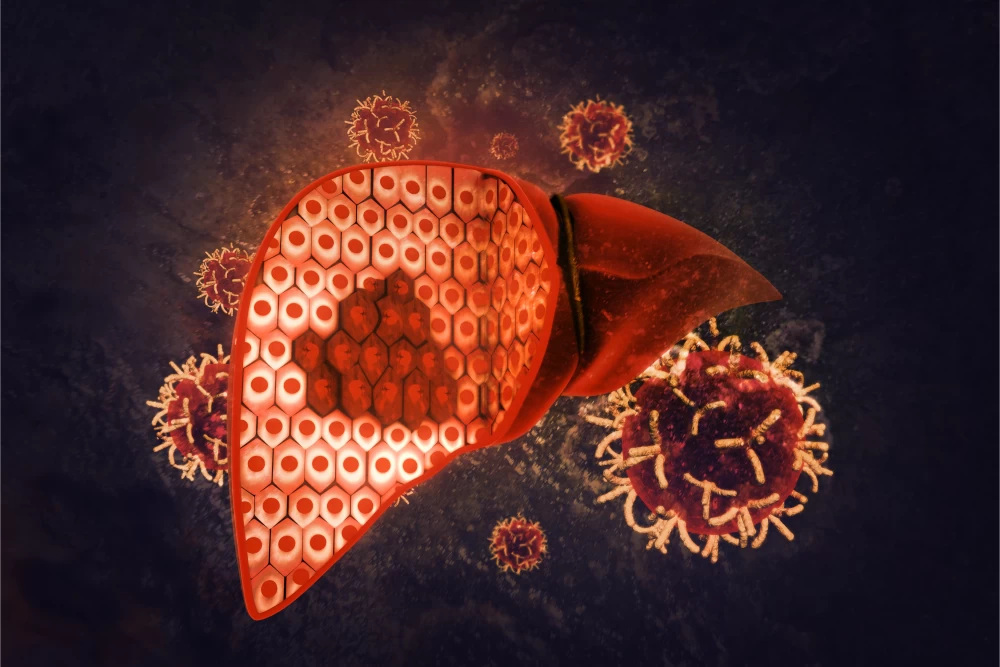
- 24th March 2023
Table of Contents
Fatty Liver & Chocolate
While chocolate is a well-loved treat, those with fatty liver may wonder if indulging in chocolate is safe for their health. The answer depends on the type of chocolate consumed and the individual's overall diet and lifestyle habits. Dark chocolate, which contains higher amounts of cocoa solids, may have some benefits for those with fatty liver due to its antioxidant properties that can help reduce inflammation in the liver. However, it's important to note that consuming too much chocolate, regardless of type, can lead to weight gain and worsen symptoms of fatty liver. Additionally, many commercially available chocolates are high in added sugars and unhealthy fats which can contribute to further liver damage. Therefore, it's best to consume chocolate in moderation as part of a balanced diet that includes plenty of fruits, vegetables, whole grains and lean protein sources. Ultimately, if you have concerns about how your consumption of chocolate may be impacting your fatty liver or overall health status, it's always a good idea to speak with your healthcare provider or registered dietitian for personalized guidance on how best to optimize your nutrition intake.
Causes of Fatty Liver
One of the primary causes of fatty liver is excessive alcohol consumption. When you drink heavily, your liver has difficulty breaking down fats and processing them for energy. As a result, fat accumulates in your liver cells, leading to the development of fatty liver disease. Another common cause of fatty liver is obesity or being overweight. When there's an excess amount of body fat, it tends to accumulate around organs like the liver, causing inflammation and damage. This can lead to an accumulation of fat within the organ itself. People with type 2 diabetes may also be at risk for developing fatty liver disease due to insulin resistance. Insulin resistance makes it difficult for the body to process glucose effectively and can lead to high blood sugar levels that damage organs like the liver.
The Benefits of Chocolate
One of the benefits of chocolate is its potential to improve liver health. Fatty liver disease occurs when there is an accumulation of fat in the liver, leading to inflammation and damage. Studies suggest that consuming cocoa or dark chocolate can reduce the amount of fat stored in the liver and lower markers of oxidative stress, which are linked to fatty liver disease. However, it's important to note that this benefit is specifically associated with cocoa or dark chocolate, not milk chocolate or other sugary treats. In addition to potentially improving liver health, chocolate contains compounds that have been shown to have anti-inflammatory effects on the body. Chronic inflammation has been linked to a variety of health issues such as heart disease and cancer. Consuming moderate amounts of dark chocolate may help reduce inflammation in the body and protect against these diseases. Finally, eating chocolate can also boost mood by increasing levels of serotonin in the brain. Serotonin is a neurotransmitter responsible for regulating mood and feelings of well-being. Eating a small amount of dark chocolate may be just what you need to feel happy and content during a stressful day!

Is it Safe to Indulge?
Fatty liver disease is a condition that affects many people worldwide. This type of liver disease occurs when there is an accumulation of fat in the liver cells, which can cause inflammation and damage to the organ. While it may seem counterintuitive, indulging in chocolate may actually be beneficial for those with fatty liver disease. Studies have shown that consuming dark chocolate in moderation can help improve liver function and reduce inflammation. The flavonoids found in dark chocolate have been shown to have antioxidant properties that protect against oxidative stress and cell damage within the liver. Additionally, consuming small amounts of dark chocolate has been linked to lower levels of insulin resistance and improved glucose metabolism. However, it's important to note that not all types of chocolate are created equal - milk chocolate or white chocolate typically contain high amounts of sugar and fat, which can exacerbate fatty liver disease symptoms. It's best to stick with small portions (1-2 ounces) of high-quality dark chocolate with a cacao content above 70% for maximum health benefits without added sugars or unhealthy fats.
Impact on Fatty Liver Disease
Fatty liver disease is a condition characterized by the accumulation of fat in the liver cells. It can be caused by various factors, including obesity, high blood sugar levels, and excess alcohol consumption. While there is no specific diet to treat fatty liver disease, some foods can help improve liver function and reduce inflammation in the body. One such food is dark chocolate. Studies have shown that consuming dark chocolate can help lower insulin resistance and improve liver enzyme levels in patients with non-alcoholic fatty liver disease (NAFLD). Dark chocolate contains flavonoids that have antioxidant properties and may help reduce oxidative stress in the body. Moreover, it has been found to decrease inflammation markers associated with NAFLD. However, it's important to note that not all types of chocolate are created equal. Milk chocolate or white chocolate does not contain as many flavonoids as dark chocolate does. Additionally, consuming too much sugar and saturated fats found in processed chocolates could exacerbate fatty liver disease symptoms. Therefore, moderation is key when incorporating dark chocolate into your diet for its potential health benefits on fatty liver disease management.
How to Enjoy Responsibly
When it comes to indulging in sweet treats like chocolate, it's essential to take responsibility for your health and well-being. One way to do this is by practicing moderation. Instead of consuming an entire bar of chocolate in one sitting, try breaking off a small piece and savoring it slowly. This approach not only allows you to enjoy the flavor more fully but also reduces the likelihood of overindulging. Another way to enjoy responsibly is by being mindful of what type of chocolate you're consuming. Dark chocolate with a high percentage of cocoa solids has been shown to have several potential health benefits, including reducing inflammation and improving heart health. On the other hand, milk chocolate or those with added sugars may contribute to weight gain and other negative health effects. Lastly, incorporating physical activity into your routine can help offset any negative effects that indulging in sweets may have on your body. Regular exercise can improve liver function and aid in digestion, making it easier for your body to process any excess sugar or fat consumed from indulgent treats like chocolate.
Conclusion: Moderation is Key
In conclusion, moderation is key when it comes to indulging in chocolate while trying to manage fatty liver disease. Chocolate can be a delicious treat that offers numerous potential health benefits, but it should not be consumed in excess. Too much sugar and fat can exacerbate fatty liver disease, so it is important to keep portion sizes small and limit consumption. One strategy for enjoying chocolate without overindulging is to opt for high-quality dark chocolates that contain at least 70% cocoa solids. Dark chocolate contains less sugar and fat than milk or white chocolate, making it a healthier choice. Additionally, pairing small amounts of chocolate with other healthy foods like fruits or nuts can help balance out the overall nutritional value of your snack. Overall, there's no need to completely eliminate chocolate from your diet if you have fatty liver disease – just remember that moderation is key! With careful attention to portion sizes and choosing high-quality options when possible, you can still enjoy this sweet treat while taking care of your health.














